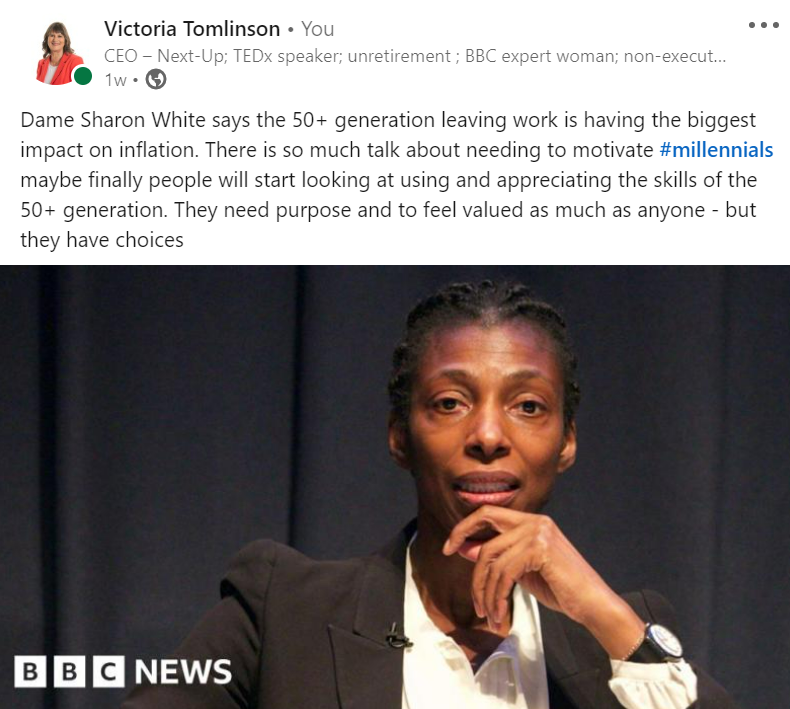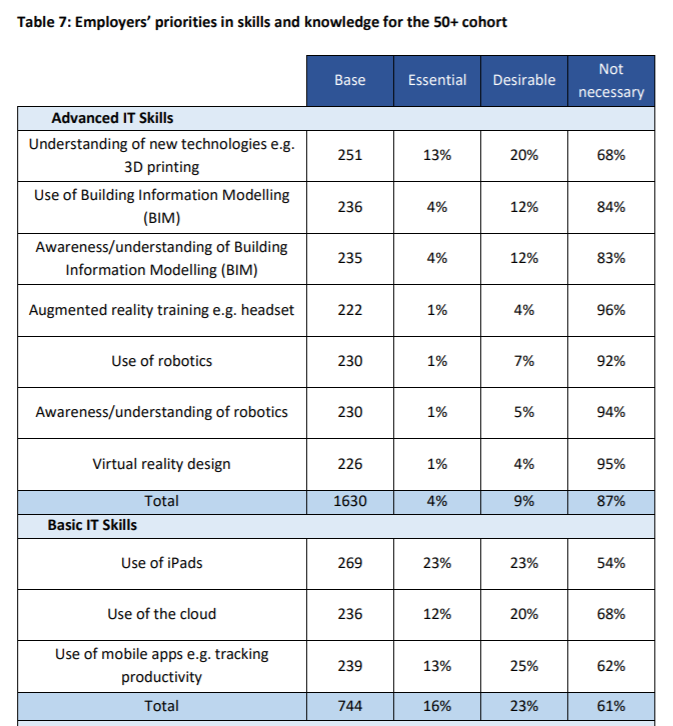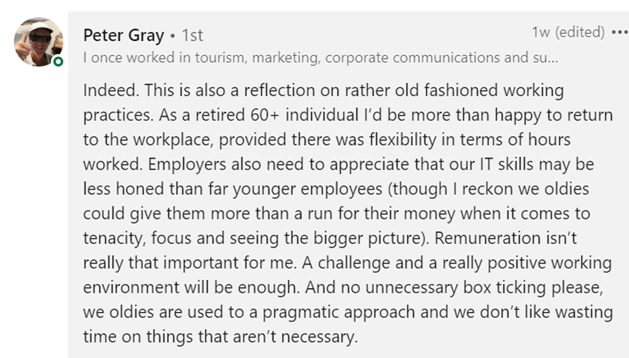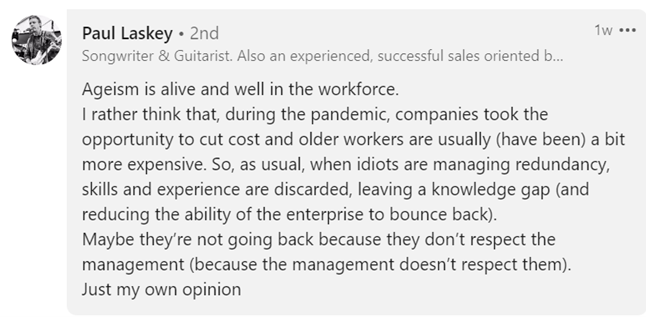Is 50+ generation the answer to skills shortage (partly)?
23 August 2022 By Victoria Tomlinson

Last week I shared the BBC’s interview with Dame Sharon White on my LinkedIn and added my own comment. It made LinkedIn’s newsfeed and I was interested and slightly shocked at the evidence of how the 50+ generation feels about work. No wonder they are leaving in droves.
An ex-Treasury civil servant and now chair of John Lewis Partnership, including Waitrose, Dame Sharon said, “I would encourage…any government to really think much more about how to encourage more people back into work”.
My response was, “There is so much talk about needing to motivate #millennials maybe finally people will start looking at using and appreciating the skills of the 50+ generation. They need purpose and to feel valued as much as anyone – but they have choices.”
I have to say, I am not sure what Dame Sharon is thinking the government should do. It seems to me this is an employer problem and there is a shed load that they need – and can – do.
1. What are the issues of 50+ employees?
What have employers got wrong and why are the 50+ generation leaving work in droves? Could the 50+ generation help narrow the skills gap rather than increasing it?
Here I list the issues – and have interspersed with screengrabs of the comments that were left on my LinkedIn post. They don’t neatly match the issues but you can clearly hear the frustration of this generation.
Issue #1 – technology
I have spoken to so many employers who say, “I recognise we have invested heavily in the skills of new recruits and early career employees. We don’t do enough for the older generation.” I think that should be “we don’t invest at all”.

Employers complain that the 50+ generation are not good with technology – but whose fault is that? They have not invested in them. Research carried out by the government in their report, Fuller Working Lives in Construction, gives clear evidence of this lack of investment. 87% of employers said it was not necessary to invest in advanced IT skills of employees aged 50+. And yet these are the supervisors and managers who have to manage employees using these tools; they are the directors and financiers approving investment.

Issue #2 Age discrimination legislation
For all its good intentions, the law has made employers terrified of raising issues connected with age. They have no idea how to discuss succession planning because that means mentioning the dreaded retirement word. Employers cannot now have a fixed retirement date and instead, seem to use redundancy as a way to ‘open up opportunities’ for the younger generations.

Issue #3 Older employees are expensive
Long ago, employers created a problem by automatically increasing someone’s pay the longer they worked somewhere. Actually, I agree with this in principle – loyalty should be rewarded. But after ten, 20 or 30 years, employers may be looking at their wage bills and thinking they could have twice as many people half their age and get the job done as well. Experience is not recognised or valued.

Issue #4 Pre-retirement creates deadwood
Employers have low expectations of employees’ pre-retirement. They don’t set new challenges or give new targets. They talk about the ‘glide to retirement’. Shudder. It’s a dull virtuous circle of boredom and low achievement.

Issue #5 Employees are terrified of the ‘outside world’
If you have only ever worked for one employee – as is still the case for many of the 50+ generation, you are terrified of the outside world. You have heard all about ageism in employment (you’ve seen it for yourself at work). You haven’t applied for a job since you left school or uni. No-one will employ you. What on earth can you do? You can’t imagine the future, so you stay in your comfort zone – the devil you know – when in your heart you want to leave.

2. How can employers re-motivate, engage – and retain or attract – older generations?
Here is my top ten of how employers can address some of this problem. Get it right and you should drive productivity in your business, get inter-generational collaboration, create ambassadors for the future and … address some of your skills gaps.
One Slice the stats by age
How do you analyse your employee satisfaction surveys? Have you done it by age? Pour yourself a stiff drink if you haven’t done this before and prepare for a shock.
Two Age in diversity
Check your diversity and inclusion policies – is age one of the pillars of diversity? Are you checking your recruitment is representative and welcoming for all age groups?
Three Motivating pre-retirement
You CAN offer pre-retirement support that is more than financial planning. Next-Up has launched a platform that is motivating about options and possibilities after full time working. Employees can see a future and start thinking and discussing succession planning.
Four Create flexible contracts
You will see from the screengrabs in this blog, people aged 50+ may be keen to keep working, but many/most don’t want the old, rigid, full-time contracts. Creating a variety of flexible, part-time contracts can be a real value add for employers – an experienced generation are often happy to work in tricky times such as school holidays when many parents need to take leave. Talk to employees and ask – what options would they like? And create a flexible pattern that includes them.
Five Invest in tech training
Covid showed that 80- and 90- (and 100-) year olds are perfectly capable of using tech when there is a reason to do so. Whether that’s Zoom to see their grandchildren or going online to order essential food. Make sure your tech trainers are empathetic to older employees and insist that every employee must have good tech skills. They will respond.
Six Involve in ESG
Get your experienced generation involved in ESG initiatives – net zero carbon emissions, working with schools in deprived communities, encouraging women into leadership roles and more. They will have a lot to offer, be good at much of this – and it will re-energise them and give them new skills that could be useful after their retirement.
Seven Rethink employment contracts
Look at the comments that employees posted on my LinkedIn. Now think of that generation in your workforce. Ask them to work with you and rethink contracts to training. Discuss the issue of ‘older employees are expensive’. See whether you can find new ways to reward people that value them but make them affordable.
Eight Leadership from the top
Where do you openly say that you value the skills of the 50+ generation? What examples are there? Do you believe it yourself? Look at your organisation through the eyes of experienced employees – what would you change and do/say if you were them?
Nine Look for 50+ positives
This is not all a nice-to-have but serious, good business. Last year, the David Lloyd Fitness Centres announced they are employing a 55+ fitness trainer in every club, to create a welcome to older generations. If you waken up this generation and value their contribution more – who knows what opportunities they can suggest for your organisation? Look at what these employees have gone on to do – what could they have done for their previous employer?
Ten Try the Next-Up platform!
I would say this, I know! But the Next-Up Retirement Platform is designed to inspire people with ideas as to what they can do later in life. It covers all the above issues from the employee perspective. Encourages them to think about staying with their employer but with a more flexible contract. And suggests they get involved in ESG initiatives. Above all it is motivating and inspiring. It should re-energise employees and let them start those tricky conversations with you.
We can still offer free testing to a few employers. Contact us if you are interested.


